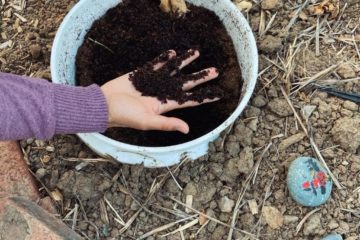Written by Taylor Mogavero, Program Coordinator
We have the perfect weather in the Bay Area for lemons. The best part about lemons is you don’t even need a yard to have a lemon tree! Lemon trees grow extraordinarily well in pots and can still produce hundreds of pounds of lemons in its lifetime even when potted.
Image from Southern Living
Taking care of a potted lemon tree requires attention to several key factors. Here are some guidelines to help you care for your potted lemon tree:
Type of Lemon Tree
There are several types of lemons to choose from: Eureka (normal) or Meyer (hybrid of lemon and orange), normal height or dwarf. All work well in pots, so choose what you most desire.
Location
Place your lemon tree in a spot that receives at least 6-8 hours of direct sunlight per day. Ensure it has adequate airflow around it. If you live in an apartment, balconies are a great spot to put them.
Pot Selection
Choose a large pot with multiple drainage holes to allow excess water to escape. Lighter colored pots should be chosen over darker ones to prevent the roots from getting too hot. Terra cotta pots are better than plastic ones since they allow more airflow. The pot should be at least 18-24 inches in diameter and provide enough space for the roots to grow. Trees will need to be repotted every few years until the tree reaches its full, mature size.
Soil
Use well-draining soil specifically formulated for citrus trees or a mixture of regular potting soil and perlite. This helps prevent waterlogging and promotes healthy root development.
Watering
Lemon trees need regular watering, but overwatering can lead to root rot. Water deeply when the top inch of soil feels dry, and allow excess water to drain away. Ensure the pot has good drainage to prevent waterlogged soil. If you live in an area that gets a lot of fog, you do not need to water your lemon tree as often. In the wet or foggy months, one deep watering once per month should be sufficient. If soil is damp, do not water.
Fertilization
Feed your lemon tree with a balanced, organic citrus fertilizer following the package instructions. Apply fertilizer during the growing season (spring and summer) to provide necessary nutrients for healthy growth. Don’t want to use fertilizer? You can supplement with homemade or store-bought compost.
Pruning
Prune your lemon tree to maintain its shape, remove dead or diseased branches, and promote airflow and light penetration. Prune in late winter or early spring before new growth starts. When your lemon tree is young, you want to prune all branches except for 2-4 main branches. Keep low branches and prune higher ones so your lemon tree does not grow too tall. Prune “weak” branches that will not hold the weight of a lemon. Keep branches that have any blooms.
Image from New Garden
Pests and Diseases
Monitor your lemon tree for common pests like aphids, scale insects, or mites. Treat infestations with organic insecticidal soap or neem oil. Watch for signs of diseases like citrus canker or fungal infections and take appropriate measures if needed.
Temperature
Lemon trees are sensitive to cold temperatures. The Bay Area is warm all year long, so winters are not a problem for potted lemon trees. Lemon trees do not tolerate frost well. If the temperatures do drop below freezing, you can bring your lemon tree inside or provide frost protection, such as covering it with a frost blanket.
Pollination
Lemon trees need pollination to set fruit. If your tree does not receive many pollinators, you may need to hand-pollinate the flowers using a small brush or gently shaking the tree to help transfer pollen between flowers.
Regular Monitoring
Keep an eye on the overall health of your lemon tree, checking for any signs of stress, nutrient deficiencies, or pest infestations. Promptly address any issues that arise.
Remember that lemon trees are generally suitable for outdoor growing, but they can also thrive in pots if provided with proper care and conditions. By following these care guidelines, you can help your potted lemon tree grow healthy and produce abundant fruit.
Image from Gardening Chores
Sources:
https://www.gardeningknowhow.com/edible/fruits/lemons/growing-lemon-trees-containers.htm
https://www.foodgardenlife.com/learn/grow-lemon-trees-indoors
https://www.homedepot.com/c/ah/how-to-grow-a-lemon-tree-in-a-pot/9ba683603be9fa5395fab9054f13aa1
https://newgarden.com/learning-center/pruning-young-fruit-trees
https://www.southernliving.com/garden/meyer-lemon-tree https://www.gardeningchores.com/growing-lemon-tree-in-pots/



0 Comments